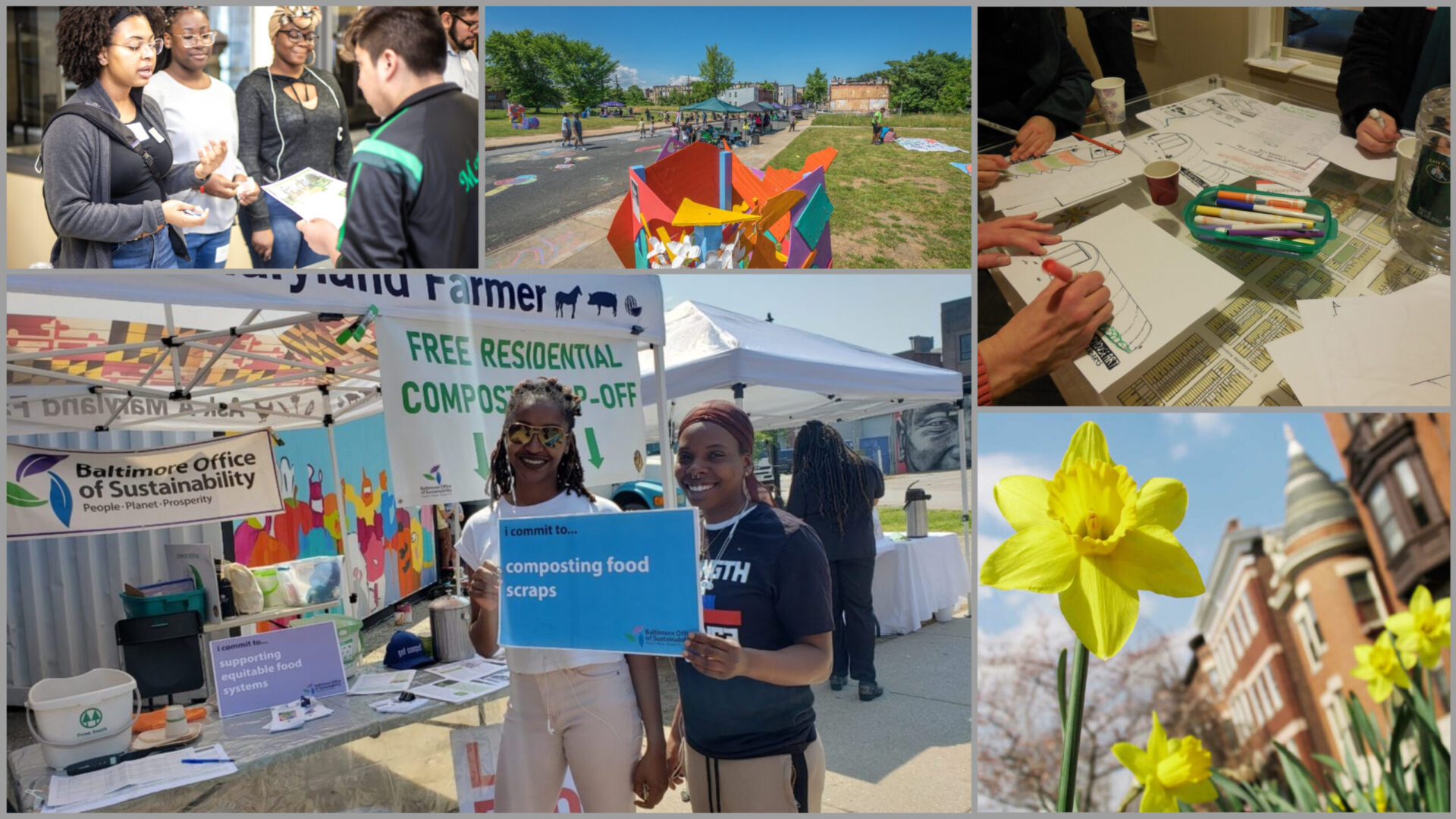Pesticide Control and Regulation
What You Need to Know: Baltimore City Council Bill 20-0495 — Pesticide Control and Regulation – took effect July 1, 2022. This regulation covers the use and application of pesticides in Baltimore City, prohibiting the use and application of glyphosate, chlorpyrifos and neonicotinoids on lawns, playgrounds, mulched recreation areas, children’s facility’s & playing fields. Note: The use of chlorpyrifos is prohibited in Maryland under
COMAR Section 15.05.01.02.
Terms and Definitions
- Pesticide: Products intended to prevent, destroy, kill, repel, or mitigate any pest such as a weed, rodents, insects and even mold.
- Herbicide: Pesticide intended to control, repel or prevent the growth of weeds or undesired plants, foliage or vegetation.
- Insecticide: A substance used to kill insects.
- Active ingredient: Active ingredients are the chemicals in a pesticide product that act to control the pests. Active ingredients must be identified by name on the pesticide product’s label together with its percentage by weight.
- Inert ingredient: Chemicals, compounds, and other substances, including common food commodities (e.g., certain edible oils, spices, herbs) and some natural materials (e.g., beeswax, cellulose). Inert ingredients play key roles in pesticide effectiveness and product performance. Examples of functions inert substances can serve include: Acting as a solvent to help the active ingredient penetrate a plant’s leaf surface; Improving the ease of application by preventing caking or foaming; Extend the product’s shelf-life; Improve safety for the applicator; Protect the pesticide from degradation due to exposure to sunlight.
*Note:
Inert does not mean non-toxic. All inert ingredients must be approved by EPA before they can be included in a pesticide.
Source: US. EPA, Basic Information about Pesticide Ingredients. URL: https://www.epa.gov/ingredients-used-pesticide-products/basic-information-about-pesticide-ingredients#active
Frequently Asked Questions (FAQs)
What does the Pesticide Control Regulation do?
The regulation protects public health and welfare, minimizes the potential hazards pesticides pose to people and the environment consistent with the public interest in benefits derived from the safe use and application of pesticides.
Why is this important?
Pesticides contain compounds which can pose a threat to human health, the environment and plant, animal or insect species, especially when misused or overused. The Pesticide Control Regulation further regulates the use of three active ingredients found in common pesticides – glyphosate, neonicotinoids, and/or chlorpyrifos. The bill also allows additional compounds to be regulated if new details reveal a threat to public health. New information about the potential threat of pesticides is routinely made available through research, scientific inquiry and data analysis. As we gain a better understanding of the risks associated with the use of different types of pesticides or substances, it is imperative that actions are taken to prevent adverse health effects and mitigate the effect any substances has on our residents and environment, in Baltimore City and the entire Chesapeake Bay watershed region.
For more information about the risk pesticides may pose, visit these web pages:
What are the main goals of the pesticide control regulation?
To inform the public about pesticide applications and minimize the use of pesticides. It also addresses public health and environmental issues associated with certain pesticides.
What pesticides are regulated?
Pesticides, including herbicides and insecticides, that contain glyphosate, chlorpyrifos and/or neonicotinoids are currently regulated. However, additional pesticides that pose a significant threat to the health of Baltimore residents or the environment may be included in the list of prohibited pesticides in the future.
Does the regulation prevent residents from purchasing pesticides, herbicides or insecticides?
No. The regulation covers the use and applications of certain pesticides, herbicides and insecticides. You can buy pesticides, herbicides or insecticides with the aforementioned substances, however, these products cannot be applied by residents within the Baltimore City limits.
What are the public health concerns associated with glyphosate, chlorpyrifos and/or neonicotinoids?
To learn more about the potential impacts glyphosate, chlorpyrifos and/or neonicotinoids have on human health, the environmental or different animal species, please visit the U.S. Environmental Protection Agency’s and the U.S. Food and Drug Administration’s websites.
How are pesticides regulated?
The Federal Insecticide, Fungicide, and Rodenticide Act (FIFRA) regulates the distribution, sale and use of pesticides nationally. All pesticides distributed or sold in the United States must be registered (licensed) by EPA. Before EPA may register a pesticide under FIFRA, the applicant must show, among other things, that using the pesticide according to specifications “will not generally cause unreasonable adverse effects on the environment.”
Visit The U.S. EPA’s website to learn more: https://www.epa.gov/laws-regulations/summary-federal-insecticide-fungicide-and-rodenticide-act
In the state of Maryland, the Maryland Department of Agriculture Pesticide Regulation Section directs the sale, use and application of pesticides across the State.
Sources:
How can I learn more about the safe use and application of pesticides, herbicides and insecticides?
First, consider whether you need to use a pesticide. Alternatives to the application of pesticides exists and should be explored before considering the use of more toxic chemicals. More information is available on EPA’s website. A ‘Least Toxic Control of Pests in the Home and Garden’ is available on the Maryland Pesticide Education Networks webpage.
Who do I contact if there is another substance that impacts public health, the environment or other animal specials that should be further regulated/controlled by the City?
Please send requests or information related to adding substances or ordinances to the list of regulated and controlled pesticides, please email sustainability@baltimorecity.com.
Can I be penalized for applying pesticides, herbicides or insecticides that contain glyphosate, chlorpyrifos or neonicotinoids?
Yes.
What types of lands/areas does the regulation apply to?
The regulation applies to the application of the aforementioned substances on lawns, playgrounds, mulched recreation areas, children’s facility’s & playing fields.
How does the regulation impact city agencies use of pesticides?
Baltimore City Recreation and Parks has not used chlorpyrifos for over 10 years, and is carefully reviewing its use of the chemical glyphosate. We are evaluating our procedures to mitigate any risk to our staff, the public and the environment. Currently, our use of glyphosate is in adherence to Maryland state and federal guidelines. We encourage residents to learn more about glyphosate practices and regulations on our website at bcrp.baltimorecity.gov/glyphosate.
How does the regulation impact Baltimore City School Public Schools?
According to the code: “
Nothing in this subtitle applies to any property that is used and maintained by the Baltimore City Board of School Commissioners.”
Can I be fined if I apply glyphosate or neonicotinoids for my home or business?
Yes. Individuals will be issued a violation on the first offense and a citation of $250 on the second offense.
Documents and Forms
- Signed City Council Bill 20-0495 – Pesticide Control and Regulation
- Application Variance Form: The Commissioner of Health may authorize the use or application of glyphosate on a determination that a threat exists that requires the use of glyphosate and no other pesticide or class of pesticide would be effective in addressing the threat. The use of chlorpyrifos will not be authorized by the Commissioner of Health, because this pesticide is prohibited in Maryland under COMAR Section 15.05.01.02.
- Pesticide Emergency Use Form: If a pesticide is applied under subsection (b)(10) of health code 19-302, the person applying the pesticide must notify the Baltimore City Health Department of the application and articulate the reasons for the use of the pesticide within 24 hours after the application is made.
Skip back to main navigation

